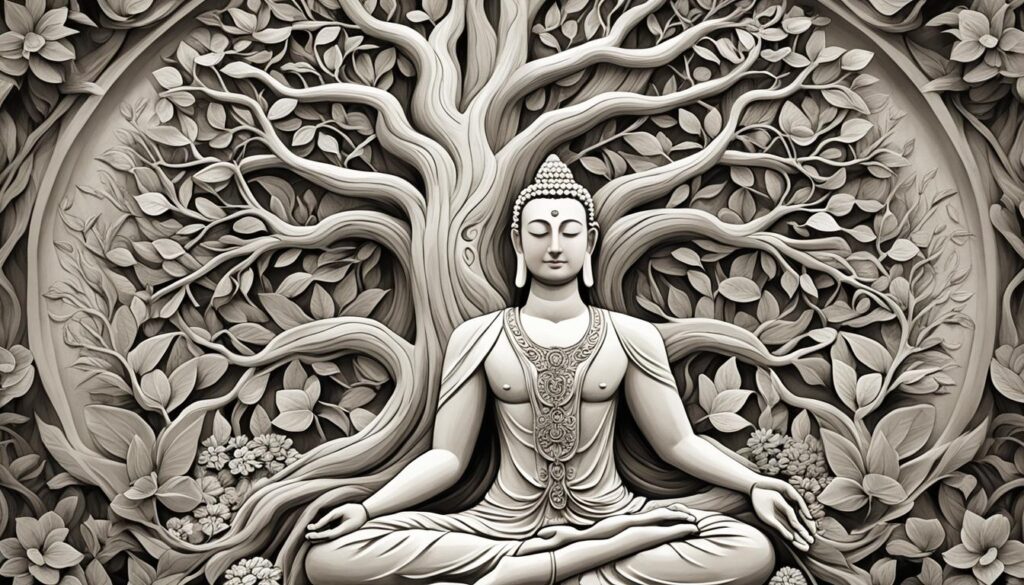“Do not dwell in the past, do not dream of the future, concentrate the mind on the present moment.” – Buddha
Welcome to the fascinating world of Buddhism, a philosophy that has shaped the lives of millions for over two millennia. If you’ve ever wondered where Buddhism began and how it has evolved over time, you’re in for an enlightening journey. Exploring the origins of Buddhism will not only deepen your understanding of this profound faith but also shed light on its impact on personal and societal harmony.
Key Takeaways:
- Buddhism was founded by Siddhartha Gautama, known as the Buddha, over 2,500 years ago in India.
- Buddhism is a non-theistic faith focused on achieving enlightenment and inner peace.
- The path to enlightenment involves morality, meditation, and wisdom.
- Buddhism teaches the Four Noble Truths and emphasizes concepts like karma and reincarnation.
- Buddhism has spread globally, with various forms practiced in different parts of the world.
The Beliefs and Practices of Buddhism
Followers of Buddhism don’t acknowledge a supreme god or deity but instead focus on achieving enlightenment, a state of inner peace and wisdom. This spiritual state is said to be experienced when followers reach nirvana. The founder of Buddhism, Siddhartha Gautama, is considered an extraordinary being but not a god. The path to enlightenment is attained through morality, meditation, and wisdom. Buddhism emphasizes avoiding self-indulgence as well as self-denial. Buddha’s most important teachings, the Four Noble Truths, are essential to understanding the religion. Buddhists embrace the concepts of karma (the law of cause and effect) and reincarnation (the continuous cycle of rebirth). Followers of Buddhism can worship in temples or in their own homes. Buddhist monks follow a strict code of conduct, which includes celibacy.
Key Beliefs and Practices:
- Focus on achieving enlightenment and inner peace.
- Founder Siddhartha Gautama is considered extraordinary but not a god.
- Enlightenment is attained through morality, meditation, and wisdom.
- Emphasis on avoiding self-indulgence and self-denial.
- Four Noble Truths are essential to understanding the religion.
- Embrace the concepts of karma and reincarnation.
- Worship in temples or in their own homes.
- Buddhist monks follow a strict code of conduct, including celibacy.

The History of Buddhism and Its Founder
Siddhartha Gautama, the founder of Buddhism, lived during the 5th century B.C. Born into a wealthy family in present-day Nepal, Gautama was deeply moved by the suffering he witnessed in the world. In search of answers, he renounced his luxurious lifestyle and embarked on a spiritual quest for enlightenment.
Gautama devoted himself to the “Middle Way,” a life of balance and moderation, avoiding both extreme indulgence and extreme asceticism. After six years of rigorous spiritual practice, he achieved enlightenment while meditating under a Bodhi tree.
For the rest of his life, Gautama, now known as the Buddha or the “Awakened One,” dedicated himself to teaching others about the path to enlightenment and liberation from suffering. His teachings were based on the Four Noble Truths, which explain the nature of suffering, its causes, and the path to overcome it.
After Gautama’s passing, his followers organized Buddhism as a religious movement, and it spread throughout India. In the 3rd century B.C., Buddhism became the state religion under Emperor Ashoka the Great, who played a crucial role in its expansion and development.
However, Buddhism started to decline in India in later centuries due to factors such as invasions and the spread of Islam. Despite this decline, Buddhism continued to thrive in other parts of Asia and eventually spread to different regions of the world.
Today, there are various types of Buddhism practiced worldwide, each with its unique traditions, teachings, and practices. These include:
- Theravada Buddhism: Predominant in Thailand, Sri Lanka, Cambodia, Laos, and Burma.
- Mahayana Buddhism: Prevalent in China, Japan, Taiwan, Korea, Singapore, and Vietnam.
- Tibetan Buddhism: Practiced in Tibet, Nepal, Mongolia, Bhutan, and parts of Russia and northern India.
- Zen Buddhism: A form of Mahayana Buddhism practiced in many areas.
- Nirvana Buddhism: Closely related to Theravada Buddhism with a focus on achieving nirvana.
Each branch of Buddhism has its own unique interpretations of Buddha’s teachings and practices, offering followers various paths to enlightenment and spiritual fulfillment.
The Spread of Buddhism in India (Table)
| Period | Key Events in Buddhism |
|---|---|
| 5th Century B.C. | Buddhism founded by Siddhartha Gautama |
| 3rd Century B.C. | Buddhism becomes the state religion of India under Emperor Ashoka the Great |
| 8th to 12th Century A.D. | Decline of Buddhism in India due to invasions and the spread of Islam |

Despite its decline in India, Buddhism has continued to captivate the hearts and minds of millions of individuals around the world. Its timeless teachings and emphasis on inner peace and compassion have attracted followers from all walks of life, and its influence continues to expand beyond its traditional Asian roots.
Key Beliefs and Practices in Buddhism
Buddhism is guided by the teachings of Buddha, known as dharma. It encompasses a set of beliefs and practices that help individuals navigate the path towards enlightenment and liberation from suffering. Central to Buddhism are various principles and concepts that shape the faith’s core values.
Buddhism Beliefs
At the heart of Buddhist beliefs are the Four Noble Truths. These truths, as taught by Buddha, explain the nature of suffering, its cause, and the path to liberation from suffering. They are:
- Dukkha (suffering): Life is characterized by suffering and dissatisfaction.
- Samudaya (cause of suffering): The cause of suffering is attachment and desire.
- Nirodha (cessation of suffering): Suffering can be eliminated by extinguishing attachment and desire.
- Magga (path to the cessation of suffering): The Eightfold Path is the way to end suffering.
The Eightfold Path serves as a practical guide for ethical conduct, mental discipline, and the attainment of wisdom. It consists of eight interrelated principles that individuals should follow in their everyday lives:
- Right Understanding
- Right Thought
- Right Speech
- Right Action
- Right Livelihood
- Right Effort
- Right Mindfulness
- Right Concentration
Buddhism emphasizes the importance of leading a moral life. Buddhists live by five moral precepts, which prohibit killing living things, taking what is not given, engaging in sexual misconduct, lying, and using drugs or alcohol.
Buddhist Practices
Buddhists engage in various practices to deepen their understanding and experience of the faith. These practices include:
- Meditation: Buddhists practice meditation to cultivate mindfulness, develop concentration, and gain insight into the nature of reality.
- Chanting: Chanting sacred texts and mantras is a common practice in Buddhism, promoting spiritual focus and mental tranquility.
- Pilgrimage: Buddhists undertake pilgrimages to sacred sites associated with Buddha’s life and teachings as a means of deepening their spiritual connection.
- Offerings: Buddhists make offerings such as flowers, candles, and incense to express gratitude and honor the enlightened beings.
Buddhism also has a rich tradition of holy books, which provide guidance and insights into the faith. These include the Tipitaka (the Pali Canon), containing the teachings of Buddha, sutras, and the Tibetan Book of the Dead.
A prominent figure in Buddhism is the Dalai Lama, the spiritual leader of Tibetan Buddhism. The Dalai Lama is considered an embodiment of compassion and peace, and his teachings inspire millions worldwide.

The image above depicts a Buddhist monk meditating, emphasizing the practice of meditation as a key aspect of Buddhism.
Buddhist Holidays
Buddhists celebrate various holidays throughout the year, commemorating significant events in Buddha’s life and teachings. One of the most important Buddhist holidays is Vesak (also known as Buddha Purnima or Buddha’s Birthday). Vesak commemorates the birth, enlightenment, and death of Buddha, and is observed with meditation, ceremonies, and acts of kindness and generosity.
| Holiday | Date | Significance |
|---|---|---|
| Vesak | Full moon day in May | Commemorates Buddha’s birth, enlightenment, and death. |
| Asalha Puja | Full moon day in July | Commemorates Buddha’s first sermon. |
| Kathina Ceremony | October/November | End of the rainy season retreat for monks. |
The table above highlights a few significant Buddhist holidays and their respective dates, offering a glimpse into the celebrations and their meanings.
The Spread and Diversification of Buddhism
Buddhism, originating in India, has gradually spread and diversified across the globe. Today, different types of Buddhism are practiced worldwide, each with its unique traditions and beliefs.
Types of Buddhism
Buddhism has evolved into various branches, each with its distinct characteristics. Let’s explore some of the prominent types:
- Theravada Buddhism: This form of Buddhism is prevalent in Thailand, Sri Lanka, Cambodia, Laos, and Burma. Theravada adheres closely to the original teachings of the Buddha and emphasizes personal enlightenment through meditation and ethical living.
- Mahayana Buddhism: Widely spread in China, Japan, Taiwan, Korea, Singapore, and Vietnam, Mahayana Buddhism focuses on compassion, wisdom, and the ideal of becoming a Bodhisattva, one who aids others in their journey to enlightenment.
- Tibetan Buddhism: Known for its rich rituals and spiritual practices, Tibetan Buddhism holds significance in Tibet, Nepal, Mongolia, Bhutan, and parts of Russia and northern India. It incorporates elements from Bon, the indigenous religion of Tibet.
- Zen Buddhism: A practice within Mahayana Buddhism, Zen Buddhism emphasizes direct experience and meditation. It is popular in various regions and has gained significant recognition in the West for its focus on meditation and mindfulness.
- Nirvana Buddhism: This form of Buddhism aligns closely with Theravada Buddhism and emphasizes the attainment of nirvana, the state of liberation from suffering. It is practiced in various countries and communities that follow Theravada teachings.
These are just a few examples of the diverse types of Buddhism practiced today.
Buddhism’s Global Influence
Buddhism has reached far beyond Asia, finding followers in different parts of the world, particularly in the West. The teachings of Buddhism resonate with many individuals seeking spiritual growth, personal harmony, and mindfulness. As a result, Buddhism’s influence is steadily growing outside of its traditional cultural boundaries.
Buddhism’s impact in the West can be seen through the popularity of mindfulness meditation, which is rooted in Buddhist practices. Mindfulness has become widely embraced as a means to reduce stress, enhance focus, and promote overall well-being.
Spread of Buddhism
| Region | Types of Buddhism |
|---|---|
| Thailand, Sri Lanka, Cambodia, Laos, Burma | Theravada Buddhism |
| China, Japan, Taiwan, Korea, Singapore, Vietnam | Mahayana Buddhism, including Zen Buddhism |
| Tibet, Nepal, Mongolia, Bhutan, parts of Russia and northern India | Tibetan Buddhism |
| Various countries following Theravada teachings | Nirvana Buddhism |
| Western countries | Diverse forms of Buddhism, including adaptations and hybrid practices |
This table highlights the spread of Buddhism across different regions and the types of Buddhism practiced in each area.
The popularity of Buddhism continues to grow, and its principles offer valuable insights and practices for individuals seeking personal growth, mindfulness, and a deeper understanding of the world.
Buddhism in the Modern World
Buddhism has made a profound impact on the modern world, influencing numerous aspects of society, from personal well-being to societal harmony. Its teachings of mindfulness and compassion have gained widespread acceptance and have significantly influenced fields such as psychology, philosophy, and healthcare.
One of the key contributions of Buddhism to the modern world is its emphasis on mindfulness. Mindfulness practices, derived from Buddhist teachings, have gained popularity for their ability to improve focus, reduce stress, and enhance overall well-being. Mindfulness meditation, in particular, has become a widely adopted practice in the West, helping individuals cultivate present-moment awareness and find inner peace.
Compassion, another fundamental aspect of Buddhist teachings, has also played a crucial role in addressing modern challenges. The practice of compassion involves showing empathy and kindness towards others, fostering understanding and harmony within society. In a world facing various social, economic, and environmental issues, compassion offers a pathway towards collective solutions and a more harmonious coexistence.

Buddhism provides valuable insights into addressing the modern challenges individuals and societies face. Its teachings offer guidance on finding personal harmony amidst the complexities of contemporary life. By cultivating mindfulness, individuals can develop a greater sense of self-awareness, equanimity, and inner peace.
Moreover, Buddhism promotes societal harmony through teachings on compassion, social responsibility, and ethical conduct. These principles encourage individuals to consider the well-being of others and strive for a more just and equitable society.
Buddhism’s impact extends beyond its original cultural context. The influence of Western ideas and values has led to the integration of Buddhist teachings into diverse cultures around the world. The adoption of mindfulness practices, in particular, highlights the willingness of individuals and societies to embrace and adapt Buddhist wisdom for the betterment of well-being in the modern world.
The Growth of Mindfulness Meditation
One of the most significant impacts of Buddhism in the modern world is the increasing popularity of mindfulness meditation. As individuals seek ways to navigate the fast-paced, stressful nature of modern life, mindfulness meditation offers a powerful tool for cultivating presence, managing emotions, and promoting overall mental well-being.
Mindfulness meditation involves bringing attention to the present moment, engaging with experiences non-judgmentally, and fostering deeper self-awareness. Numerous scientific studies have demonstrated the benefits of mindfulness meditation, including reduced stress, improved cognitive function, enhanced emotional regulation, and increased feelings of well-being.
The integration of mindfulness practices into various sectors, such as education, healthcare, and workplaces, further exemplifies Buddhism’s impact on modern society. Mindfulness-based interventions are now utilized in schools to support students’ emotional well-being and improve focus and concentration. In healthcare settings, mindfulness practices are integrated into psychotherapy, stress management programs, and pain management approaches.
Overall, Buddhism’s teachings of mindfulness and compassion continue to shape the modern world, offering valuable insights into addressing personal and societal challenges. By embracing these teachings and practices, individuals and societies can strive towards greater personal well-being, social harmony, and a more compassionate world.
| Benefits of Mindfulness Meditation | Applications of Mindfulness |
|---|---|
|
|
Conclusion
Buddhism, founded by Siddhartha Gautama over 2,500 years ago in India, has a profound history and has touched the lives of millions of people worldwide. Its teachings centered around mindfulness, compassion, and addressing suffering offer invaluable insights for fostering personal and societal harmony.
From its humble origins in India, Buddhism has spread its wings across Asia and beyond, diversifying into various forms such as Theravada, Mahayana, Tibetan, Zen, and Nirvana Buddhism. The impact of Buddhism on the world is undeniable, providing guidance and solace to those navigating the challenges of modern life.
Buddhism’s teachings encourage individuals to cultivate well-being and spiritual growth through the practice of mindfulness and the development of compassion. The relevance of these teachings goes beyond religious boundaries, as they have found resonance in fields like psychology, philosophy, and healthcare.
Looking to the future, Buddhism continues to evolve and adapt, addressing the ever-changing needs of individuals and societies. Its emphasis on personal insight, inner peace, and empathy serves as a guiding light amidst the complexities of the modern world. Through Buddhism, we can strive for personal and societal harmony, fostering a better future for ourselves and those around us.
FAQ
Where did Buddhism begin?
Buddhism began in India over 2,500 years ago.
Who founded Buddhism?
Buddhism was founded by Siddhartha Gautama, also known as the Buddha.
Is Buddhism a religion?
Buddhism is considered a major world religion, although it is often described as a philosophy or moral code.
What are the beliefs of Buddhism?
Buddhism revolves around the concept of suffering and its causes. It teaches followers to seek enlightenment and inner peace.
Do Buddhists believe in a god or deity?
No, Buddhism is a non-theistic faith and does not revolve around a supreme god or deity.
How do Buddhists achieve enlightenment?
Buddhists strive to achieve enlightenment through morality, meditation, and wisdom.
What are the Four Noble Truths?
The Four Noble Truths are the most important teachings of Buddha and explain the nature of suffering, its cause, and the path to liberation from suffering.
What is the Eightfold Path?
The Eightfold Path is a set of principles that guide ethical conduct, mental discipline, and the attainment of wisdom in Buddhism.
How do Buddhists worship?
Buddhists can worship in temples or in their own homes. Buddhist monks also follow a strict code of conduct.
Where is Buddhism practiced?
Buddhism is most prominent in East and Southeast Asia, but its influence is growing throughout the West.
How has Buddhism spread throughout the world?
Buddhism has diversified into various forms, including Theravada, Mahayana, Tibetan, Zen, and Nirvana Buddhism, and has spread to different parts of the world.
What impact has Buddhism had in the modern world?
Buddhism has influenced various fields such as psychology, philosophy, and healthcare. Its teachings of mindfulness and compassion have found widespread acceptance.
Does Buddhism promote personal and societal harmony?
Yes, Buddhism offers insights for personal and societal harmony by addressing modern challenges and promoting well-being and spiritual growth.
What is the significance of mindfulness in Buddhism?
Mindfulness is a key practice in Buddhism that helps individuals cultivate awareness and be fully present in the moment.

